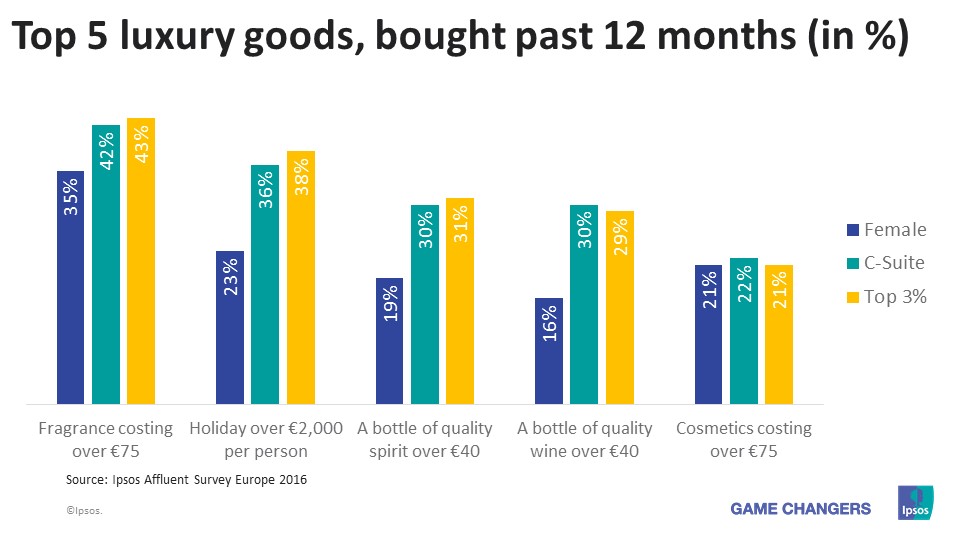Affluents Don't Spend Like Bill Gates
Although the average European Affluent will probably never earn as much income as Bill Gates, they do also earn an income that is far above average. (€50,513) Does that mean their average spending habit is also similar to that of Bill Gates? The answer is no.
The income of the Affluent brings a less modest spending habit. The Top 3% and the C-Suite *are the regions greatest ‘easy’ spenders. When asked about purchasing luxury goods in the last 12 months fragrances, vacations and quality spirits overtake the top of the list.
*Definition C-Suite: Paid employed and Chairman, CEO, CFO or other director/boardmember or Self employed and number of employees worldwide is 50+.
Top 5 luxury items: affluent indulges
Fragrance, holiday, wine/spirit and cosmetics are in the top 5 of luxury goods bought by the affluent in the past 12 months. The Top 3% and C-Suite seem to be the easy spenders for these and other luxury goods.
 Fragrance and cosmetics have a more female touch or smell if you like, but the Top 3% and the C-Suite even outscore the female Affluents on this point.
Fragrance and cosmetics have a more female touch or smell if you like, but the Top 3% and the C-Suite even outscore the female Affluents on this point.
The lowest rating luxury item, is the membership of a golf club for at least € 1,600 per year, only 1.5% of the Affluents have such a membership. But it is of no surprise that the Top 3% and C-Suite have the membership of expensive golf clubs as well
Main drivers to buying a car
A car is anything but an average purchase, even for the Affluent.
When purchasing a car, economic considerations still prevail even among the Affluent, above technique and/or design. The purchase price is by far the most important, followed by fuel consumption.
 The figures from the Affluent Survey show that the Top 3% and the C-Suite put less emphasis on the purchase price, around 40%. While female Affluents put greater emphasis on fuel economy than men, 53% mainly look at the purchase price and 33% take fuel consumption into consideration.
The figures from the Affluent Survey show that the Top 3% and the C-Suite put less emphasis on the purchase price, around 40%. While female Affluents put greater emphasis on fuel economy than men, 53% mainly look at the purchase price and 33% take fuel consumption into consideration.
Other factors outside the top 10 are; the luxe finishing, digital entertainment and country of origin. They play a minimal role in the purchase of cars.
In the households of the Affluent Europeans the average number of cars is 1.7 with an average purchase price of € 20,496 per car.
Watch out
The similarity between the car and watch market is the marketing of the brands themselves. Rolex, within the Affluent target group is the best known brand, but high awareness is not directly correlated with sales. The following chart shows the 10 best-known brands compared with the ownership of those brands. Rolex has the biggest gap between ownership and brand awareness, conversely Swatch - has the smallest gap.
 Swatch and Casio are the most common watches on the wrists of the affluents. However, many of Europe’s most Affluent own multiple watches – a Swatch for one occasion and a Rolex for another.
Swatch and Casio are the most common watches on the wrists of the affluents. However, many of Europe’s most Affluent own multiple watches – a Swatch for one occasion and a Rolex for another.
While the average price for two thirds of Affluent respondents is less than € 750, due to a relatively small number of individuals with high value watches the average purchase price for watches is € 1,000, with the Top 3% and C-Suite spend nearly the double: € 1,890 and €2,045.
About Ipsos Affluent Survey
The Ipsos Affluent Survey, the media survey among global Affluents, is a survey designed to measure the media and consumption habits of the most affluent consumers and top business decision makers on the planet.
The survey in Europe has enjoyed the status of the industry standard for multi-country planning since its conception in 1995. Nowadays Ipsos examines the habits of the affluent population in 39 countries across Europe, Africa, the Middle East and Latin America.
The Affluent Surveys are part of the Ipsos suite of Affluent surveys, also covering the Ipsos Affluent Survey Asia Pacific and the Ipsos Affluent Survey USA. Due to this broad offer of regions, Ipsos is not only in the position to offer a combined dataset for Affluent EMEA, but also a reflection of an even more global universe, by combining our survey regions with Asia Pacific – released as The Global Ipsos Affluent Survey.
To meet the need of the market Ipsos delivers the Affluent Surveys in intelligent media planning software, in collaboration with a list of well-known (international) software agencies.
Since 1 January 2015, the names of all EMS surveys have been rebranded to Ipsos Affluent Surveys.
49% of the Affluents are considering to buy a new watch in the next 12 months and the average value will be almost € 1,100.



